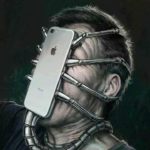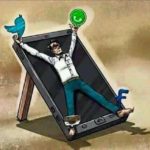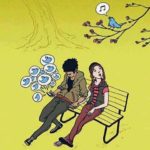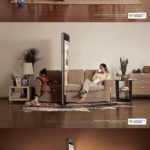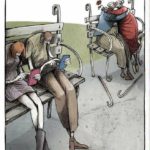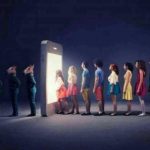I want you to really examine those pictures. I stumbled across them on facebook, I know ironic because this post is about how we have been unsocialized by such social media and technological devices.
When looking through these photos, I really reflected on my own self. Do I do these things? Am I so occupied by my technological device that I don’t notice what is around me? Hmm.. in many ways I am. And, that to me, is scary to admit.
Has technology made our world less sociable? These pictures certainly represent that don’t they. My own eyes have seen it. A first hand example is how my aunt hands her son an iPad when she needs him to be occupied or doesn’t want to be bothered. Maybe it is effective, but it is really sad to think about this divide that technology has instilled in us as a society, even as a family. I have noticed times when I am frustrated and yell at my mom to get off the phone. But… it has become our world. Is our world our phones? Our world is revolving around all the technological advances that have occurred.
Social media and technology has socialized our society into being unsociable.
How often have you gone to restaurants and seen people on their phones rather than holding a conversation with one another? Our lives are so dependent on and distracted by our handheld devices. Society being unsociable is represented not only in ourselves and our interactions but in children as well. It is increasingly becoming harder to teach children social skills because they are often just handed devices. The only way we learn how to be social is if we ARE social. And I mean social in general because social in person is very different than social online. I grew up playing outside, not playing fortnite.
So class, I ask you to think…..and think hard
When is the last time you’ve appreciated the world and its surrounding without capturing a picture of it? When is the last time you spent more than 3 hours without looking at a handheld device? I say that because after a long period of time (and I know 3 hours is not even long) the first thing I do is check my phone. The first thing I do in the morning when I wake up is check my phone. It has become routine.
Are we more interested in our social media lives (our lives online) rather than in one another?
On the other hand although in many ways technology has brought us all together, it has undoubtedly pushed us apart. These pictures represent the divide that our technological devices has instilled in us as a society, as people who interact with each other.
Think about it, there was once a time where we would only communicate in person. When my parents were growing up they didn’t have cell phones to call their parents as to what time they would be home, but it was an expectation that when the street lights turned on for the night time, that was their cue to come home. The world was more outdoors, more involved. Now our lives seem to be less involved with the outdoors and more invovled in video games or our computer/phone screens.
I think if we reflect on our own selves and admit to the attachment that comes with having these incredibly smart technological devices and social media apps at our fingertips, you will appreciate more. You will acknowledge the impact instead of being blinded by it.
So yes, technology and social media all help us stayed connected, but they disconnect us in so many important ways that need to be acknowledged.

